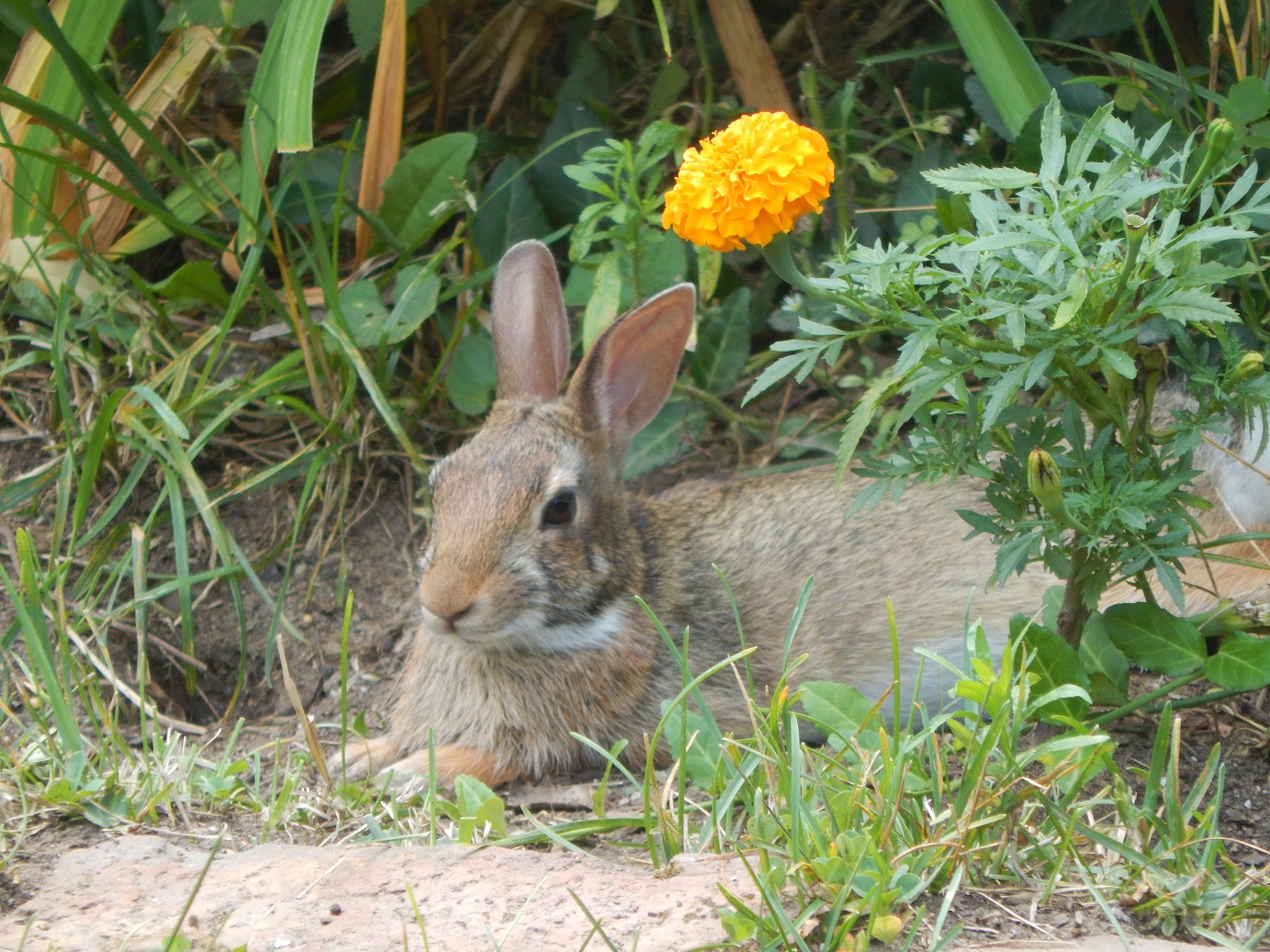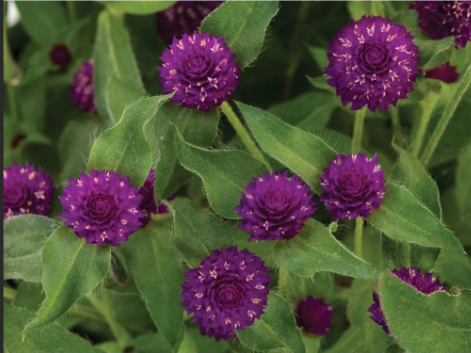Can this wonderful flower, when planted mature, keep away animals and bugs? I have read this on a few sites and want to know if it works. Is it true or even partly true? Has anybody done this themselves?
7 Answers
Many people plant marigolds (Calendula officinalis, not the French marigold, Tagetes) as a 'trap' crop, but the 'trap' attracts aphids, particularly blackfly. The theory is, if the blackfly inhabit the marigolds, they won't inhabit your roses or whatever it is you're trying to protect.
In my experience, blackfly do love marigolds - not quite as much as they love nasturtiums, possibly - but there are so many of them, not only are the marigolds covered in blackfly, but so are any surrounding plants they particularly like. Doesn't stop me growing calendula anyway - I love their cheerful colour and their repeat flowering habit (if you deadhead, that is).
As for Tagetes, the French marigold, this one is said to be a companion plant underneath tomatoes to keep whitefly away. In general, there's very little scientific evidence for the idea of companion planting, but that doesn't mean some of the ideas don't work - there just hasn't been much scientific testing going on. Here's a link for more information
https://www.sarahraven.com/articles/companion_planting_-_protect_with_plants.htm
I haven't done specific research, but am happy to provide you with my personal experience.
Every year I grow many varieties of marigolds and they're always among the least bothered in my garden. Animals who eat annuals and perennials planted alongside my marigolds almost always completely ignore them. Those include chipmunks, rabbits, squirrels, and larger things like raccoons and opossums.
However, if I don't have any other flowers at all, the marigolds are somewhat vulnerable, but not in a fatal way. Very rarely, if there's nothing else at all, one of my outdoor friends will bite the stem, leave the flower on the ground and not bother the root system. The marigold basically looks like I've dead-headed it, and pretty soon it produces more flowers.
I've never found bugs of any kind on either the flowers or the leaves, even when they've decimated related species, such as dahlias, in the same garden.
I don't use pesticides, and am frequently willing to give up a plant if something living out there wants it that badly. One of the reasons I grow so many marigolds is that I know I'll have a very long season and a lot of happy plants!
Here's a baby bunny resting under my marigold. The hole to the left of its head is from a young snapdragon plant which had been uprooted by a chipmunk. I know it was a chipmunk because I saw him do it!
-
So Sue...do you live in the country with lots of bunnies, raccoons? Deer? And no bunny fencing? And they leave not only the marigolds alone but the plants nearby? How nearby? My bunnies will eat onions and garlic. Haven't used marigolds but maybe this year I'll just try it. Why hasn't anyone done scientific research on this? So simple. I've played with marigolds in the past don't remember callendula or tagetes. Which do you use? Love your attitude by the way!– stormyCommented Apr 5, 2016 at 18:37
Marigolds will keep some animals away - works best on insects. Some people say marigolds will keep cats out of a bed, but I have had some feral cats that hadn't read this and they went in the beds and did their thing where the marigolds were. Marigolds will keep nematodes away from the members of the Solanacea family - tomatoes, peppers, petunias, tobacco, potatoes.. (For anyone who wants to get uppity about tobacco - I'm a Traditional Indn; we grow tobacco because it is Holy so you need not offend us by patronizing us about our use of it. Thank you.) Cheers!
Oh cute...Marigold plants are said to help keep predators/insects away but I've never seen anything that would verify this...grow marigolds for their beauty...they are STINKY so maybe that helps. Grins, I've never seen that marigolds helps with; cutworms, aphids, slugs, earwigs, powdery mildew, or any regular problem for other ornamentals. Vigilance, going out at night for instance to see what is going on...is the bestest pesticide ever. Some very simple concoctions are worth their weight in gold. Such as high pressure water stream. Making sure you keep the humidity down especially at night. Milk (1:9 ratio) is incredible with powdery mildew, cats for mice (do not use poison), and I use Neem when truly challenged. Great stuff. But read the dang information closely! Best to use preventative measures not the bandaids of pesticides. Companion planting is cool but in all my years of education and experience never have I seen a difference. Takes a broader and more educated understanding to make a difference. Ventilation...lots of moving air, not so much moisture...takes pruning and adding more ventilation...going out at night to chop cutworms in half...there would be only a few, slugs same thing only get them on the lawn, poor things, earwigs; get rid of their 'condominiums' and favored habitat...do not rely on Marigolds for any kind of protection.
-
1Just make sure it's Tagetes patula, which keeps away some root pests, rather than Calendula officinalis, which is used more medicinally. Companion planting is also often specific to particular plants or pests. I have the most success planting sage near brassicas, as it's recently kept away not only cabbage moths but some tiny flies that a couple of other plants in the mint family couldn't manage to deter. Commented Apr 4, 2016 at 21:17
-
Hmm. Our sage didn't keep away cabbage moths. It was just a coincidence that the sage was near the cabbage, though. Maybe it wasn't close enough. I think marigolds must be a trap crop for slugs, because when I was a kid, slugs were rare, but I would find them in the Marigolds pretty consistently, one year when we had marigolds. Commented Apr 8, 2016 at 0:25
I seem to have fewer aphids on my runner beans when I plant marigolds nearby.
I try to plant the marigolds at the same time as the beans. Planting marigolds after aphids appear does not get rid of them, in my experience. I have not taken any 'scientific' measurements, this is just a subjective observation. In about 30 years of growing beans, the 4 (approximately) with marigolds suffered less from blackfly.
-
Perhaps you could explain a bit more about why you seem to have fewer aphids. For example, describe your aphid infestations before you planted marigolds; how many years of growing runner beans without marigolds nearby versus how many years you have been growing them with marigolds.– user13580Commented Apr 5, 2016 at 18:57
-
I try to plant the marigolds at the same time as the beans. Planting marigolds after aphids appear does not get rid of them, in my experience. I have not taken any 'scientific' measurements, this is just a subjective observation. In about 30 years of growing beans, the 4 (approximately) with marigolds suffered less from blackfly. Commented Apr 5, 2016 at 21:28
-
@PeterBill can you amend your answer with your comments. Thxs. Commented Apr 5, 2016 at 21:42
-
Yes ,even I have planted many marigolds over 3-4 years in our garden, they are great at keeping away insect pests and diseases. I have even tried to make a kind of cocktail with neem leaves and marigold leaves for spraying on plants.
But ,since a year our garden's squirrel population has grown and they were getting desperate for food ,having eaten their fair share of mangos, bananas, papayas ,guavas ,sapota ,and even tiny pomegranates. This is the worst part.
They have started consuming the fleshy ovaries of marigold flowers ,shredding the flowers ,leaving the petals on the ground like conifetti .I know this because I have seen squirrels scurrying away to tree tops with marigolds in their mouth! Update: Now that there are no marigolds in season they have attacked the bachelor's buttons.
I am interested in the comment about planting the marigolds with the vegetables as a pest deterrent. The only time I used the small marigold plants there were lots of insects in and on the tomatoes, basil etc. I have returned to planting the seeds for the marigolds on the early side in our raised beds. One thing that deters the squirrels in the raised beds is an old, gross tennis ball that our son’s dog chased and brings back to us. I bring Nellie, the dog, a few fresh tennis balls and take the yucky ones from their yard about once/year. Then I place the yucky balls in my flower and vegetable gardens! Works like a charm.
-
1This does not provide an answer to the question. Once you have sufficient reputation you will be able to comment on any post; instead, provide answers that don't require clarification from the asker. - From Review Commented May 17 at 20:31
-
Your answer could be improved with additional supporting information. Please edit to add further details, such as citations or documentation, so that others can confirm that your answer is correct. You can find more information on how to write good answers in the help center.– Community BotCommented May 18 at 15:00


